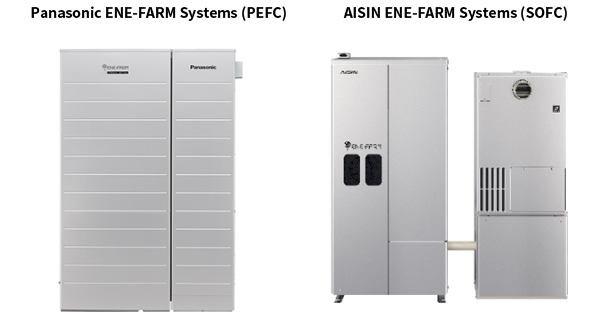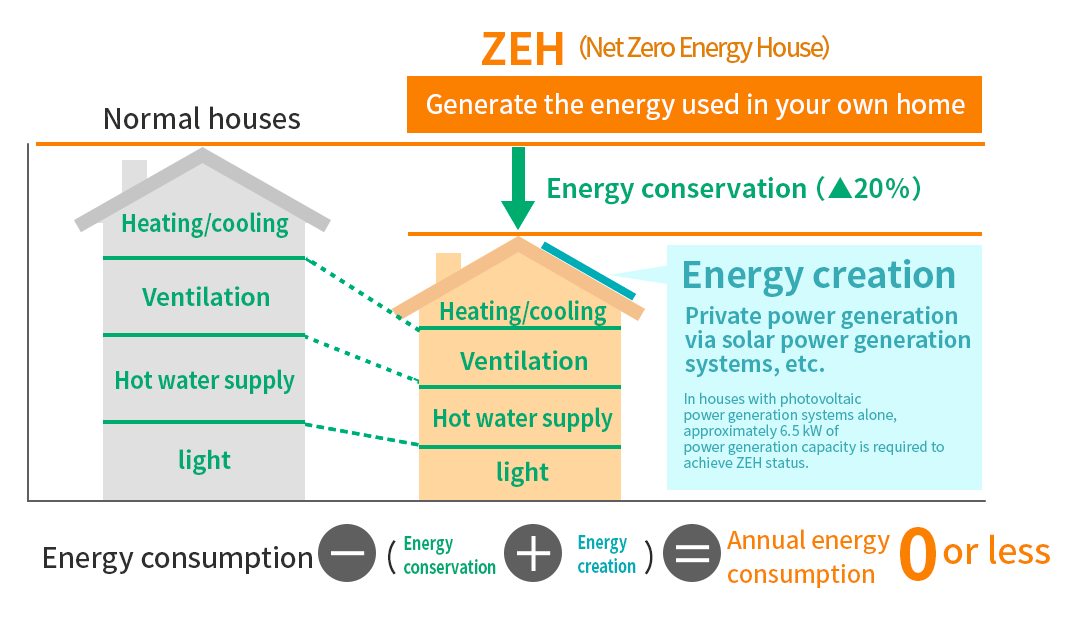Sales of New Energy Systems
We are working to help realize lifestylesthat contribute to the reduction ofCO2 emissions through sales of ENE-FARMhousehold fuel cells,which offer significant energy-generationand energy-saving benefits.
We are working to help realize lifestyles that contribute to the reduction of CO2 emissions through sales of ENE-FARM household fuel cells,which offer significant energy-generation and energy-saving benefits.
Promoting Adoption of ENE-FARM Household Fuel Cells
As global society strives to realize a decarbonized society by 2050, energy companies must contribute to the reduction of CO2 emissions through the sale of energy-saving technologies and systems.
One way we are working to achieve this is by promoting the adoption of ENE-FARM household fuel cells.
ENE-FARM technology offers not only environmental benefits in the form of low-carbon energy, but also provides value in a range of other areas, including outstanding resilience and economic efficiency through its private power generation capability. Accordingly, we believe this is one technology that energy companies should actively promote going forward.
We also provide training programs to support our dealers in their efforts to market ENE-FARM technology.
What is ENE-FARM?
ENE-FARM is a household fuel cell system that derives its name from the words “energy” and “farm”.
ENE-FARM systems generate electricity via a chemical reaction between hydrogen extracted from gas, and the oxygen in the air.
The heat emitted during electricity generation is utilized for water heating in kitchens and baths, achieving efficient energy use and greatly contributing to energy conservation.
In addition, the electricity generated by ENE-FARM can be used to power lights, televisions, and other devices, helping to reduce electricity consumption.
Furthermore, ENE-FARM offers outstanding resilience, as it is capable of generating electricity even during power outages.
There are two types of ENE-FARM systems: polymer electrolyte fuel cells (PEFCs) and solid oxide fuel cells (SOFCs).
We source and sell both types of system.

Advantages of ENE-FARM
Resilience
With power outages becoming more frequent with the increase in natural disasters, there is a growing need to strengthen household resilience in the event of a disaster.
ENE-FARM, which is equipped with resilience functions, ensures comfortable and secure living even in the event of an emergency.
Hot water and electricity are available, even during a power outage
If a power outage occurs while ENE-FARM is generating electricity, it switches to power outage generation mode and continues generating electricity, so that hot water and electricity can continue to be used even when the power supply is down.
+Panasonic ENE-FARM systems are capable of generating up to 500 W of electricity, while AISIN systems can generate up to 700 W.
As power generation continues uninterrupted, the household can continue to use hot water, including showers as well as gas hot-water underfloor heating.
Panasonic systems also store water in the hot-water tank that can be used as non-potable water in an emergency, providing peace of mind in case of a water outage.
Note: During a power outage, electricity is supplied via a dedicated outlet for power outages.
Contributing to ZEH
What is ZEH?
ZEH (Net Zero Energy House) residences are homes that are energy self-sufficient, meaning that the energy generated by the home is greater than the annual primary energy consumption, or that the difference between the two is net zero.
The Japanese government has set a goal of achieving ZEH in all new homes on average by 2030, and is conducting a national initiative to promote ZEH.

Initiatives by major housemakers
In addition to solar power generation systems, energy generation systems are an essential part of ZEH. The addition of ENE-FARM technology, which is highly efficient in both creating and saving energy, is a key step toward realizing ZEH, as it reduces the number of solar panels required, allowing greater design flexibility in home construction.
Although ENE-FARM, which contributes to ZEH, is seeing increasing adoption in homes, primarily those constructed by major housemakers, there is growing anticipation that other, smaller housemakers will also adopt ENE-FARM technology in order to meet ZEH specifications, which will be required for all new homes built in Japan in the future.
